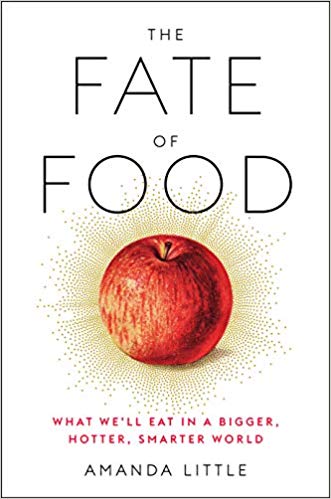You have /5 articles left.
Sign up for a free account or log in.
 The Fate of Food: What We'll Eat in a Bigger, Hotter, Smarter World by Amanda Little
The Fate of Food: What We'll Eat in a Bigger, Hotter, Smarter World by Amanda Little
Published in June 2019
There are two types of people who think about the future of higher ed, and two types of people who think about the future of food.
There are the Wizards. And there are the Prophets.
Wizards believe in progress. They have faith that the arc of history bends toward advancement. Wizards think that we will be able to harness new technologies and new thinking to create a future for our children and grandchildren that will be better than today. Wizards don't deny that there are problems. However, Wizards tend to see problems as opportunities.
Prophets believe not only does history not run in one direction but that unless big changes are made, the future will be worse than the present. Prophets are truth tellers in an age of marketingspeak. A Prophet will speak for those without a voice, and will loudly call out the inconvenient truths that the rest of us would like to ignore
I was reminded about how higher ed is populated by Wizards and Prophets by Amanda Little, who builds on Charles Mann's fabulous book of that same name when discussing the future of food.
In The Fate of Food, Little starts with Prophet-leaning tendencies -- but through her reporting and writing eventually gains sympathy for a more Wizardly view of the future of food.
The Fate of Food starts with a question. When it comes to the future of food, Little asks, "How screwed are we, exactly?"
Little's question about the future of food is the same question that almost all of us are also asking about the future of higher ed.
When it comes to food, it is hard not to be pessimistic. World population will hit nine billion by the middle of this century. The combination of urbanization and growing incomes will ensure that all these new humans will want to eat like today's middle-income city dwellers. Diets of rice and vegetables will give way to meals of meat, grain and sugar. Agriculture accounts for 70 percent of all global water usage. A six-ounce serving of beef requires the equivalent of 674 gallons of water use, compared to 21 gallons for a salad.
Combine growing demand for energy-intensive food with the challenges of climate change and shrinking fresh water supplies, and you have all the ingredients necessary for an agricultural disaster. Little, who is a writer in residence at Vanderbilt, began her research expecting to find that things were even worse than she suspected. Instead, she discovered that at least when it comes to the future of food, that there are reasons to hope.
What forces could counteract the trends of population growth, climate change and the growing demand for industrial food? As Little shares, most doom-and-gloom forecasts about the future of food assume that how we produce, distribute and eat our food also will not change. These food assumptions, she discovered, are questionable.
In travels around the U.S. and the world, Little came to understand that how we think about what we eat is changing. She amusingly relates her efforts to feed her family a fresher diet, one with less meat and more fresh veggies. While Little is mostly a failure as a vegetarian (a difficult ask in the land of Southern barbecue), she meets loads of people who are shifting how they eat. Michael Pollan has basically won the argument that we should all "Eat food. Not too much. Mostly plants." If most of us have trouble following this advice in how we actually go about eating, at least it is hard to find many defenders of the industrial food system.
The Fate of Food is also a story of Little modifying her concerns around food and technology. Food tech. She is skeptical about GMOs but digs deeply enough into the science to wonder about the basis of her concerns. She spends time touring urban vertical farms and comes away impressed with their potential. AI-driven autonomous weeders and robot fruit and veggie pickers capture her imagination. Little is even a little bit excited about today's vegetarian meat substitutes and the potential for a future of lab-grown meat.
What makes The Fate of Food so much fun to read is to follow Little's journey from a follower of the Prophets to (reluctantly) aligning with the Wizards. We need more books where the authors are willing to change their minds. Throughout the book, Little comes across as a curious eater and busy working mom, trying hard to apply her knowledge of food to feed her family. She also demonstrates prodigious skills in synthesizing multiple streams of agricultural, economic, technological and policy trends and data. The Fate of Food is informative, accessible and delicious to read.
Academia, I'd argue, tends to select for Prophets over Wizards. The same people who are most worried about the future of food are also convinced that higher education is likely to come to a dismal end.
My favorite higher ed people are the Prophets, even if my sympathies tend to lie with the Wizards.
For Amanda Little's next book, I hope she turns her gaze to making sense of the fate of higher ed.
What are you reading?




